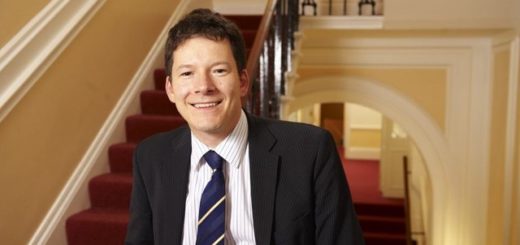Exclusive Interview with Mrs Victoria Bingham, Headmistress of South Hampstead High School
Mums in the Wood interviewed Mrs Victoria Bingham, Headmistress of South Hampstead High School on 06th May, 2021. Mrs Bingham is clearly enormously passionate and enthusiastic about her job. Her love of academia is coupled with an evolving love of nature and the outdoors which has enabled her to encourage the girls under her care not only to strive for excellence in their studies but also to live and love a healthy lifestyle.
Having known from a young age that whatever career she chose, she would like to do something that was exhilarating and purposeful, she made the decision to go into teaching in the final year of her degree when she realised that she could spend a lifetime with Cicero and Sophocles by staying in education. As soon as she started, she discovered how much she loved spending time in the company of young people – their fresh ideas, their passion, their sense of humour and hasn’t looked back and hopes to return to the class room full time one day. She is also planning to make herself available for maternity/paternity cover well into her 70s. “I cannot imagine not working in schools”.
Asked about her experience of running the Duke of Edinburgh Awards Scheme previously, she talked about how being responsible for the general administration of the scheme as an additional responsibility. She mentioned that she found it a steep learning curve not having been too savvy at the time with outdoor activities and laughing remembers her own experiences of out door expeditions, recalling that the first time she turned up (aged 24) on a camping trip she had forgotten to take a tent which the parents who were volunteering thought was hysterical. On another occasion, she and her husband had set off to walk the North Downs Way from their house in Guildford all the way to Canterbury. Unfortunately, her choice of attire – ten-year old Reebok trainers, corduroy flares, a pearl necklace and a Barbour jacket didn’t really do too well with the weather as it had rained throughout and without a proper map, the trip did not go too well. She recalled that she quickly learnt that going on expeditions required a certain amount of preparation and now runs everywhere on muddy trails and loves nothing more than gazing at OS Explorer maps. She has also now acquired an enormous amount of kit and absolutely loves the outdoors. “That’s the brilliant thing about education – it encourages you to try things you would never imagine yourself doing. Had it not been for my first boss’s confidence in my organisational skills, I would never have ended up with such a love of the natural world”. With the DofE scheme being so incredibly popular at South Hampstead, due to a team of very passionate teachers who oversee the programme record numbers have received their Bronze Awards this year, and several Sixth Formers and alumnae achieve the Gold Award each year, a fact of which she is especially proud. She is also especially grateful to the teachers for getting the pupils onto school lost property as part of their volunteering section which has taught them valuable lessons about looking after belongings…
On being asked about why she chose South Hampstead School and what she felt was the heart of the school, Mrs Bingham had this to say. “When I heard that the Girls’ Day School Trust was looking for the next Head of South Hampstead, something told me that this was the moment. I was attracted by the school’s love of learning, by its location in one of London’s great cultural centres, and by the idea of belonging to an inspiring movement in girls’ education: the GDST. The GDST Wikipedia page is the only Wikipedia page that has ever reduced me to tears – when you read about the huge wave of school openings in the 1870s and 1880s, it’s quite something.” She went on to say thatHer love of the school is apparent as she went on to say that, “South Hampstead’s spiritual heart lies in curiosity, debate and discussion, and an openness to learning. The pupil and staff body has a strong sense of purpose. Our social action projects, our partnership work and our bursary programme are at the heart of our strategic vision for our 150th anniversary in 2026. It is a very friendly community – all the staff comment on this, and I think it is why so many of them stay for so long.” She also talked about the school facilities, stating that, “The more literal heart of the school is Waterlow Hall: our state-of-the-art performance space was opened in January 2020 by former pupil Helena Bonham Carter and GDST alumna Olivia Colman, co-stars of The Crown. The concert hall has already hosted trailblazing dramatic productions, inspiring speaker events and outstanding musical concerts, as well as a multitude of live-streamed performances during lockdown. Critically, all proceeds from future rentals of Waterlow Hall will fund our bursary programme, enabling more pupils to access a South Hampstead education. We are committed to ensuring our school is a place where mutual respect and diversity can flourish.”
Question 1
Walking through the Senior school, something that really strikes a parent other than the stunning aesthetics, (from the pictures on the walls to the inspirational quotations and the sculptures), is the lengths to which the school has gone to show girls that anything is possible regardless of gender. How is this reinforced in classroom teaching?
Answer
We are fortunate to have such wonderful facilities, but of course it’s what happens inside our buildings, and what they inspire, that is important. Our teachers are truly outstanding and our staff are central to our success. Throughout Guided Home Learning, their magic has been more apparent than ever.
We have been a proudly feminist school, championing girls’ education, since 1876. But great schools don’t stand still. From digital learning resources and ergonomic furniture to an enlightened and holistic curriculum, our educational ethos is outward-looking and forward-thinking. It is important – both in and out of the classroom – that we help instil the determination and belief that our young women can compete on the biggest of stages, and prepare them to thrive and lead in tomorrow’s world.
Question 2
Is there setting in the Senior School? If so how and in which year is it introduced? What is the school’s policy on setting in the core subjects? What percentage of girls would typically be in the top sets?
Answer
All our pupils are bright and very able, so the ability range is fairly narrow. In Year 7, there is loose setting in Modern Foreign Languages, based on prior learning experience and languages spoken at home. In Years 8 and beyond, we do set in Maths and the Sciences too, although this is all within a spectrum of very capable girls.
Question 3
Does South Hampstead encourage the students to participate in national and international Maths and Science competitions like for example UKMT challenges, Maths Olympiads or the RCSU or Chemistry Olympiad challenges? Do you feel that Universities place more weight on students who excel in these challenges over those who haven’t participated but have achieved excellent AS and A/Level results?
Answer
This past year in particular has highlighted the importance of looking beyond the league tables and the value of developing new skills. We have a strong track record in challenges that stretch our pupils beyond the curriculum. Last year, one of our students achieved one of the highest scores in the county for the UK Maths Trust Challenge; a number of Scientists were awarded Olympiad Gold medals last year too – one paper was so outstanding, it was submitted to the Royal Society of Chemistry. Our pupils have also been awarded prestigious Arkwright Engineering Scholarships, commended in national poetry competitions and won numerous Oxbridge essay prizes. We also have a great track record in the Extended Project Qualification, with all students’ research projects awarded A*/A to date.
Our well-established Futures Programme helps students to navigate the rapidly evolving higher education landscape, and we have a fantastic team of experts to support girls, whether they are applying to medical school, international destinations, Oxbridge or taking a gap year.
Throughout the pandemic, we have continued to focus on developing well-rounded, well-grounded individuals who do so much more than exams. Our Speaker Series hosts high-profile guests that aim to broaden horizons – recent speakers have included former Governor of the Bank of England, Mark Carney; anthropologist Professor Alice Roberts; BBC Europe Correspondent, Katya Adler (one of our former pupils); and comedian David Baddiel, discussing anti-Semitism. Pre-pandemic, our Artists enjoyed a trip to LA, our Philosophy students travelled to India, our Scientists visited CERN. But even in lockdown, our academic scholars published online journals, our poet-in-residence delivered virtual masterclasses… and, for the third consecutive year, 20% of our Upper Sixth students received offers from Oxbridge. Others are heading to US Ivy League and other prestigious destinations to study subjects as diverse as pure Science and Music, Medicine and Economics, Integrated Design Engineering and Anthropology. We aim to expand our pupils’ horizons and guide them in whichever direction they choose.
Question 4
What in your opinion are the most important characteristics a girl growing up in the modern age would need to be successful?
Answer
I want to ensure all our young women find a sense of self and a sense of purpose – a big part of our job is to equip them with the necessary attributes for the future. We help them to develop their confidence and discover their passions, whether that’s through leading Space Society or writing poetry; being part of an orchestra or the football team; or by engaging in one of the school’s many social action projects – the online partnerships we have established during the pandemic with schools in Rio and Calcutta; our Project Zero sustainability drive; our work with local care homes, foodbanks and hospitals; the Pupil Diversity & Inclusion Council. I want our students to leave us feeling that they can take on new challenges fearlessly but also with a sense of humility. Being open to new ideas and not thinking you know everything is going to be such an important skill for the fast-paced change of the decades ahead.
We build in lots of opportunities for our pupils to express themselves and to find out what they really enjoy. A buzzing co-curricular schedule with over 140 clubs (many led by the girls themselves) is a cornerstone of our pastoral provision. We have a well-established Speak Up, Speak Out programme which teaches our students to use their voices effectively in all sorts of ways – from debating and delivering speeches, to dramatic performance, to story-telling to pitching for a new idea. The space to watch next academic year is our Rebel Minds entrepreneurs programme.
Question 5
Do girls typically sit core GCSE subjects early through school?
Answer
Music is the only subject we offer early, for our Music Scholars, although some of our students take GCSEs early in their native language. The data suggests that, on the whole, it is better for students to wait until the natural point; in any case, we do not make jumping through hoops the cornerstone of our teaching. Our pupils would find that very limiting, as would our teachers.
Question 6
Do you feel that competitive entrance exams are a necessary measure of a child’s ability and/or potential? What would you say to parents who resort to excessive tutoring in order to gain places at oversubscribed ‘selective’ schools?
Answer
As part of the London 11+ consortium, our candidates can apply for several schools but sit just one exam; the test itself is designed to identify academic potential, thus reducing the need for any arduous preparation or relentless teaching to the test – the process has been designed to be fair and accessible to girls from all schools and backgrounds, with the aim of helping to level the playing field and reduce pressure. We try to get as holistic a picture as possible of every individual and are interested in girls who can demonstrate innate curiosity and are able to think critically. Over-tutoring is often very apparent at the interview stage.
I’ve spoken out before about the effects of the educational arms race and the over strategisation of childhoods. Tutoring can rob children of the critical ability to surmount problems by themselves; I would strongly advise parents not to outsource their children’s academic challenges. They need a bit of struggle time, to think independently and to develop intellectual confidence.
Question 7
How does the school support young girls on the verge of adolescence to retain their confidence and self-esteem with all the social pressures put on young teens through social media and other channels?
Answer
A warm community and supportive pastoral framework are the foundation of our academic success. In an all-girls’ school, we can really focus on the issues that are relevant to girls. Ours is a kind and caring community of happy, resilient young people. Our co-tutor system enables every girl to have regular one-to-one sessions to ensure she is supported, making good progress and fully involved in school life. Our programme of PSHE (Personal, Social and Health Education) prepares girls to go out into the world with confidence, inner strength and high self-esteem, ready to face challenges. Parents enjoy regular evening talks and a pastoral spotlight blog offers insights into salient issues. We have a full-time nurse and counselling provision – not to mention a school dog, Maple the cavapoo. We understand how to educate girls and ultimately want to empower them to be architects of their own happiness.
Recent innovative developments include the development of our Positive Perspectives programme for Years 7, 8 and 12 and our Friendship First Aid programme for Year 7. It’s so important that schools focus not just on academic development but on holistic personal development.
Question 8
Being a single sex school, are there opportunities for the girls to get involved in activities and initiatives with the local boys’ schools?
Answer
Some of our activities – such as debating and social action projects – involve local pupils from both co-ed and boys’ schools. Our student Eco Committee are part of the London Schools Eco network, working with other pupils to share ideas and take positive environmental action. As a central London day school, there is no shortage of opportunities to socialise. We usually host an annual disco for Year 7 and 8 with many local schools and we planned a quiz night with UCS for Year 9, before Covid got in the way. And of course many pupils participate in orchestras, swimming clubs and other sports and activities outside school.
Learning in an all-girls environment is empowering – girls assume all the leadership roles and there are no gendered subjects. Our Director of STEM was recently awarded the Daphne Jackson Medal 2020 for her exceptional work in championing girls in Physics and has joined a global taskforce to develop girls’ confidence. At South Hampstead, roughly equal proportions go on to study the Arts & Humanities, Social Sciences and STEM subjects each year.
Question 9
What community initiatives do the girls and the school get involved in?
Answer
Developing local partnerships and social action initiatives was already a priority, but this has really shifted gear during the pandemic. One silver lining of digital learning is that we were able to extend our reach and impact. We have continued teaching Latin, Spanish and French to local primary pupils and invited local Sixth Formers to speaker events and our Aspirational Futures Fair; during lockdown, we were able to provide access to our Guided Home Learning to a number of local state school students.
Our own pupils volunteer with diverse social action initiatives, whether supporting disadvantaged young people to find work with Spear Camden, or helping children to develop communications skills in Calcutta and the favelas of Rio. There is at least one initiative for every year group to get involved in. Our student-led charity team galvanise the whole school community to give back and make a difference, whether fundraising to help bridge the digital divide, or connecting with isolated care home residents. Last year, they won the Mitzvah Day Outstanding Youth Achievement Award for contributing to foodbanks and fighting period poverty, and the school was recognised with the Independent School of the Year Green Award 2020 for Environmental Achievement.
I’m always delighted by our girls headline achievements and academic success, but I’m equally proud of encouraging the next generation of conscientious, morally-responsible leaders.
Conclusion:
Anyone who has been to visit the Senior school would have felt that instant overwhelming rush of the ‘wow’ factor. From the brilliant white walls to the black and white pictures, the glass cubicles and the large airy spaces to the inspirational quotes, extraordinary sculptures and art work, the focus of the girls themselves, it all feels more like a female empowered university than a school. It is easy then, to see why South Hampstead Senior produces girls of such high calibre, why their maturity and grounded views seem far beyond their years and why the little ones are so much in awe of the seniors. A system where the older children get involved in setting up clubs for the younger ones makes sure that the younger ones benefit hugely from the experiences of the older girls as well as encouraging a sense of kinship throughout the school.











